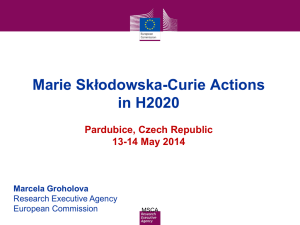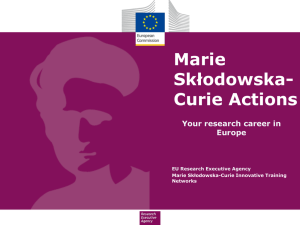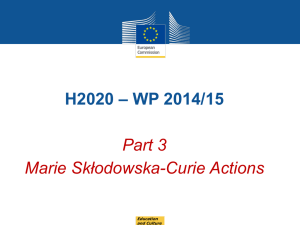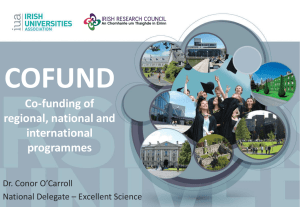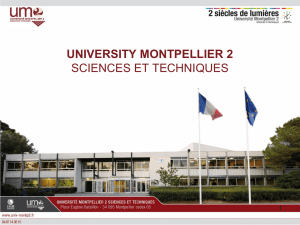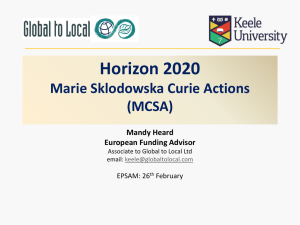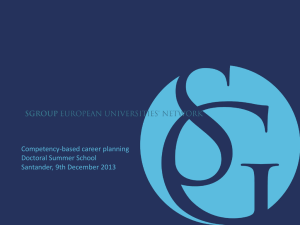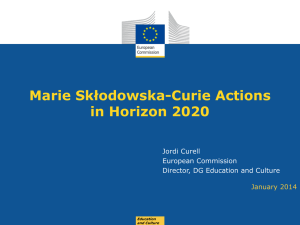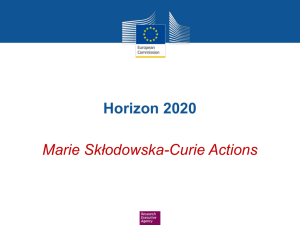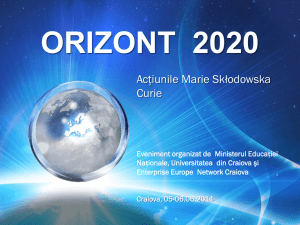Horizon 2020 -Marie Sklodowska-Curie Presentation 13-11
advertisement
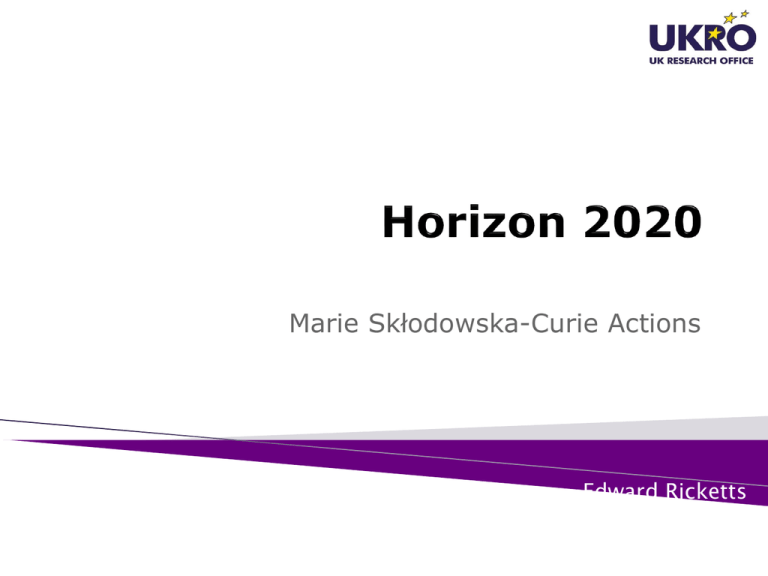
Marie Skłodowska-Curie Actions University of Edinburgh 13 November 2013 Edward Ricketts edward.ricketts@bbsrc.ac.uk UKRO’s Mission: “To promote effective UK engagement in EU research, innovation and higher education activities” The Office: • Is based in Brussels, was established in 1984 • Is sponsored by the seven UK Research Councils • Around 130 research organisations subscribe to UKRO “.. Ensure excellent and innovative research training as well as attractive career and knowledge-exchange opportunities through cross-border and cross-sector mobility of researchers to best prepare them to face current and future societal challenges” Excellent Science European Research Council (ERC) Future and Emerging Technologies (FET) Industrial Leadership Societal Challenges Health and Wellbeing Leadership in Enabling and Industrial Technologies (LEIT) ICT, KETs, Space Marie SkłodowskaCurie Actions (MSCA) Food security Transport Energy Climate action Access to Risk Finance Research Infrastructures Societies Security Innovation in SMEs Widening Participation; Science with and for Society European Institute of Innovation and Technology (EIT) EURATOM Joint Research Centre (JRC) Operates in a ‘bottom-up’ basis Open to all research and innovation domains – from basic research to market take-up Mobility is a key requirement Aim: develop new knowledge / enhance skills of people behind research and innovation Dissemination and public engagement through public outreach activities Total budget: €6.2bn (compared with €4.7bn in FP7) Early Stage Researcher (ESR) At the time of recruitment (ITN) or secondment (RISE) by the host organisation, must be in the first 4 years (full-time research experience) of their research careers and have not been awarded a doctoral degree Experienced Researcher (ER) At the time of the call deadline (IF) or secondment (RISE) by the host organisation, must be in possession of a doctoral degree or have at least 4 years of full-time equivalent research experience Academic sector Includes universities (public and private), higher education institutions (public and private), non-profit research institutions (public and private), research foundations, research institutions associated to foundations, international European interest organisations Nonacademic sector Includes any socio-economic actor not included in the academic sector Mobility Rule: At the time of the relevant deadline for submission of proposals, or recruitment/secondment by the host organisation, depending on the action, researchers shall not have resided or carried out their main activity (work, studies, etc) in the country of their host organisation for more than 12 months in the 3 years immediately prior to the reference date.” FP7 ITN Horizon 2020 ITN Innovative Training Networks (Early Stage Researchers) IEF IOF IIF IF Individual Fellowships (Experienced Researchers) CIG IAPP IRSES COFUND RISE COFUND Research and Innovation Staff Exchange (Exchange of Staff) Cofunding or regional, national and international programmes Also: Researchers’ Night “Aim to train a new generation of creative, entrepreneurial and innovative researchers, able to face current and future challenges and to convert knowledge and ideas into products and services for economic and social benefit” Competitively selected joint research training/doctoral programmes implemented by partnerships of universities, research institutions, businesses, SMEs and other socio-economic actors from different countries across Europe (and beyond). Focus on scientific/ technological knowledge through research on individual/personalised projects Exposure to non-academic sector Transferable skills training e.g. communication, research management, IP, ethics, societal outreach, entrepreneurship The ITN scheme consists of 3 strands: European Training Networks (minimum of 3 participants) European Joint Doctorates (at least 3 academic participants who can deliver a doctoral degree) European Industrial Doctorates (1 academic and 1 non-academic partner) Other new features: • Participants defined as ‘academic’ and ‘non-academic’ • Early stage researchers (ESRs) only • Innovative Doctoral Programme strand only through COFUND Beneficiaries (Participants level 1) • Signatory to the grant agreement • Full partner of a network • Contribute directly to the implementation of the joint training programme by supervising, hosting and training ESRs • Provide secondment opportunities Partner organisations (Participants level 2) • Do not sign the grant agreement • Provide training and host ESRs during secondments Four year programme (max three year support for each ESR) Activities include: European Training Networks European Joint Doctorates •At least three beneficiaries from different MS/AC •At least three beneficiaries from different MS/AC •Doctoral programme enrolment optional •Doctoral programme enrolment mandatory •Maximum 540 researchermonths •Joint governance, admission, selection, supervision, monitoring and assessment mandatory •Award of joint, double or multiple doctoral degree mandatory •Maximum 540 researchermonths European Industrial Doctorates •At least one academic and one non-academic partner from different MS/AC •Doctoral programme enrolment mandatory •Joint governance, admission, selection, supervision, monitoring and assessment mandatory •Maximum 180 researchermonths “Aim to enhance the creative and innovative potential of experienced researchers wishing to diversify their individual competence in terms of skill acquisition at multi- or interdisciplinary level through advanced training, international and intersectoral mobility” Supports Experienced Researchers only Opportunities to acquire new knowledge and work on research in a European context, or outside Europe Specific support for return and reintegration of researchers to Europe who have previously worked here Supports career restart for individuals with high potential European Fellowships •12-24 months •From any country to MS/AC •Separate multidisciplinary panels for career restart * and reintegration** Global Fellowships •12-24 months plus 12 month return phase •Secondment from MS/AC to third country •Mandatory 12 month return phase in Europe (not subject to mobility rule) Mobility rule for CAR and RIG: “researcher has not resided or carried out their main activity in the country of their host organisation for more than 3 years in the 5 years immediately prior to the relevant deadline” *) AND “researcher has not been active in research for at least 12 months” **) AND “researcher has previously been active in Europe for at least five consecutive years” • Optional intersectoral secondment that should significantly add to the impact of the research project • Must take place in a MS/AC • Must occur during the fellowship • Secondment phase can be a single period or divided into shorter mobility periods For a fellowship > 18 months, secondment phase may be up to 6 months For a fellowship ≤ 18 months, secondment phase may be up to 3 month “Aim to promote international and inter-sector collaboration through research and innovation staff exchanges, and sharing of knowledge and ideas from research to market (and vice-versa) for the advancement of science and development of innovation” Should involve institutions from the academic and non-academic sectors (particularly SMEs) based in MS/AC and/or third countries Development of joint research and innovation project partnerships Knowledge sharing via international and/or inter-sector mobility through two way secondments of (ESRs /ERs/support staff) with built-in return mechanism • Exchanges between MS/AC only: secondments must be inter-sectoral • Exchanges between MS/AC and third countries: secondments can be same sector and/or intersectoral Participants must be from at least three different countries, at least two of which are MS/AC If all participants in same sector one participant country must be a third country Secondment period - 1 to 12 months- does not need to be continuous Activities of the programme “Aims at stimulating regional, national or international programmes to foster excellence in researchers’ training, mobility and career development, spreading the best practices of MSCA” Supports new or existing programmes for international, inter-sectoral and interdisciplinary research training and transnational and cross-sector mobility of researchers Two streams Doctoral programmes Fellowship programmes Doctoral programmes Fellowship programmes • Supports ESRs • Supports ERs • Doctoral enrolment mandatory • Not open to permanent employees of the host organisation • Training and secondment opportunities with partners, particularly the non-academic sector will be advantageous • Regular selection rounds allowing fair competition • Cross-sectoral mobility encouraged “Aims to bring the researchers closer to the public at large and to increase public awareness of the research and innovation activities and the impact of researchers’ work” European Researchers’ Night takes place on the last Friday of September annually Events can start on early Friday afternoon and last until early Saturday morning Participants can be any legal entity in MS/AC and/or a partnership at regional, national or international level Funding will cover two editions of the Night (2014 and 2015) but funding for one edition only may be considered Involvement of researchers funded by FP7/Horizon 2020 encouraged Call Opens Closes Budget ITN 2014 11 Dec 2013 ? 405 M IF 2014 12 Mar 2014 ? 240 M RISE 2014 11 Dec 2013 ? 70 M NIGHT 2014 11 Dec 2013 ? 8M COFUND 2014 10 April 2014 ? 80 M ITN 2015 2 Sep 2014 ? 370 M RISE 2015 6 Jan 2015 ? 80 M IF 2015 12 Mar 2015 ? 213 M COFUND 2015 14 Apr 2015 ? 80 M Note: draft and subject to change Applications on line through the ECAS Participant Portal Apply to specific discipline panel Evaluation panels •Chemistry (CHE) •Social Sciences and Humanities (SOC) •Economic Sciences (ECO) •Information Science and Engineering (ENG) •Environment and Geosciences (ENV) •Life Sciences (LIF) •Mathematics (MAT) •Physics (PHY) Additional multidisciplinary panels for ITNs •European Industrial Doctorates (EID) •European Joint Doctorates (EJD) Additional multidisciplinary panel for IFs •Career Restart Panel •Reintegration Panel Excellence (50%) Impact (30%) Implementation (20%) Evaluation scores awarded for each criteria from 0 to 5 Each award criterion has a weighting Total score is subject to a threshold of 70% Proposals ranked Proposals funded in ranking order Evaluation summary reports provided No restrictions on re-application Excellence • • • • Quality, innovative aspects and credibility of the research programme Quality and innovative aspects of the training programme Quality of supervision Quality of the proposed interaction between participating organisations Impact • Enhancing research and innovation related human resources, skills and working conditions to realise the potential of individuals and provide new career perspectives • Contribution to structuring doctoral/ESR training at the European level and to strengthening European innovation capacity • Effectiveness of proposed measures for communication and dissemination of results Implementation • Overall coherence and effectiveness of the work plan, including appropriateness of the allocation of tasks and resources • Appropriateness of the management structures and procedures including quality management and risk management • Appropriateness of infrastructure and operational capacity of participating organisations • Competences, experience and complementarity of participating organisations and their commitment to the programme Excellence • Quality, innovative aspects and credibility of the research • Clarity and quality of transfer of knowledge/training • Quality of supervision and hosting arrangements • Capacity of the researcher to reach/reinforce a position of professional maturity in research Impact • Enhancing research and innovation related human resources, skills and working conditions to realise the potential of individuals and to provide new career perspectives • Effectiveness of proposed measures for communication and results dissemination Implementation • Overall coherence and effectiveness of work plan • Appropriateness of management structures and procedures • Appropriateness of institutional environment • Competences, experiences and complementarity of participating organisations and institutional commitment ITN • • • • • ESR living allowance €2,900/month + co-efficient ESR mobility allowance €600/month ESR family allowance €500/month Host research, training and networking €1,800/person/ month Host management and overheads €1,200 /person/ month IF • • • • • ER living allowance €4,650 / month + coefficient ER mobility allowance €600/month ER family allowance €500/month Research, training and networking €800/person/ month Management and overheads €650/person/ month RISE • • • Secondment travel & subsistence €2,000/person/ month Research, training and networking €1,800/person/ month Management and overheads €700/person/ month COFUND ESR living allowance • Salaried €2,450 €3,500/month or • Stipend: €1,225 €1,750/month ER living allowance • Salaried: €3,675 €5,250/month or • Stipend: €1,225 €1,750/month • Management €650/person/ month Host needs to cover all other costs and EC will pay up to 50% of total eligible costs Initial Training Networks • UK co-ordinators submitted 231 apps • 40 successful (17.3% success rate) • General success rate: 12.5% • UK participated in 1156 applications • 173 successful (15% success rate) COFUND • UK co-ordinators submitted 3 proposals • 2 successful (Queen Mary and Durham) • General success rate 40% Intra-European Fellowships (IEF) – Aug 2012 • • • • • International Outgoing Fellowships (IOF) – Aug 2012 • • • • • 3,708 proposals received Success rate: 16.6% UK success rate: 23.0% UK host for 237 fellowships (out of 614 funded) Approx. value to the UK € 46M 955 proposals received Success rate: 16.4% UK success rate: 29.5% UK return host for 36 fellowships (out of 157 funded) Approx. value to the UK € 9M International Incoming Fellowships (IIF) – Aug 2012 • • • • • 1,447 proposals received Success rate: 13.3% UK success rate: 18.6% UK host for 78 fellowships (out of 193 funded) Approx. value to the UK € 16M Questions? UK NCP Helpdesk Email: mariecurie-uk@bbsrc.ac.uk Phone: + 32 2 230 0318 http://www.ukro.ac.uk/mariecurie/Pages/index.aspx Contact Email: edward.ricketts@bbsrc.ac.uk Phone: +32 2 286 9056
